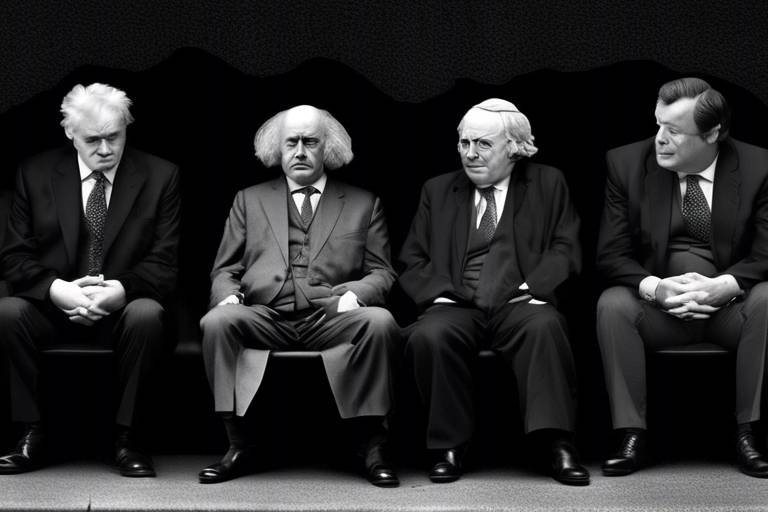Fascism - Ironic Outcomes of a Political Philosophy?
Fascism, a term that often evokes strong emotions and vivid imagery, has a complex legacy that continues to resonate in modern political discourse. While it emerged in the early 20th century as a response to perceived threats against national identity and social order, its implementation has led to a myriad of unexpected and often ironic outcomes. At its core, fascism promised strength, unity, and national rejuvenation, yet the very mechanisms it employed to achieve these goals often resulted in division, oppression, and chaos.
One of the most striking ironies of fascism is its reliance on authoritarianism to foster a sense of unity among the populace. Fascist regimes typically promote a singular vision of the nation, often at the expense of individual freedoms and dissenting voices. In doing so, they create an environment where conformity is enforced, and any deviation from the prescribed ideology is met with severe repercussions. This suppression of individuality, while aimed at strengthening the nation, frequently leads to societal fragmentation and unrest as marginalized groups resist the imposed narrative.
Moreover, the intense nationalism that fascism champions can paradoxically sow the seeds of conflict both internally and externally. By emphasizing a singular national identity, fascist movements often alienate ethnic and cultural minorities, portraying them as threats to the nation’s purity and stability. This can escalate into violent conflicts, as seen in various historical contexts where fascist ideologies fueled xenophobia and aggression. The resulting societal rifts can undermine the very stability that fascism seeks to establish, leading to a cycle of violence and repression.
Another ironic outcome of fascist governance is the militarization of society. While fascism glorifies military strength as a means of national pride and security, this focus on militarism can drain resources from essential social services and economic development. The prioritization of military expenditure over public welfare often leads to a disillusioned populace that feels neglected and exploited. In many cases, the promised security and prosperity are overshadowed by the realities of poverty and social unrest, creating a dissonance between the regime’s rhetoric and the lived experiences of its citizens.
In the economic sphere, fascism's blend of state control and capitalist elements aims to create a self-sufficient economy. However, this approach can backfire spectacularly. The suppression of dissent and the prioritization of state-approved enterprises often stifles innovation and competition. As a result, economies under fascist regimes may stagnate or even regress, leading to widespread dissatisfaction among the populace. The irony lies in the fact that the very policies intended to bolster the economy can lead to its downfall, creating an environment of scarcity and hardship.
Furthermore, the role of propaganda in fascist societies cannot be understated. While it serves to unify and mobilize the populace, it also creates a distorted reality that can backfire. Fascist propaganda often exaggerates threats and glorifies the regime, leading to a populace that is both fearful and misinformed. This manipulation of truth can result in a backlash when the promises made by the regime fail to materialize, leading to widespread disillusionment and unrest.
Ultimately, the ironic outcomes of fascism challenge the very foundations of its ideology. The contradictions inherent in its promises—strength through unity, security through militarism, and prosperity through control—often result in the opposite of what is intended. As societies grapple with the legacies of fascism, it becomes clear that the lessons learned are as vital as the historical narratives that inform them.
- What is fascism? Fascism is a far-right political ideology characterized by authoritarianism, nationalism, and often militarism, emphasizing the unity of the nation above individual rights.
- How does fascism affect society? Fascism can lead to societal division, oppression of minorities, and militarization, which often results in conflict and economic stagnation.
- What are the historical examples of fascism? Notable examples include Nazi Germany under Adolf Hitler and Fascist Italy under Benito Mussolini, both of which exemplified the principles and consequences of fascist governance.
- Can fascism still be relevant today? While the term is often used in contemporary politics, understanding its historical context is essential to recognizing its implications in modern societies.

The Origins of Fascism
Understanding the roots of fascism is crucial to grasp its evolution and the complexities that surround it. This controversial ideology emerged in the early 20th century, primarily in Europe, as a reaction to the tumultuous socio-political landscape following World War I. The war left many nations grappling with economic instability, social unrest, and a profound sense of national humiliation. In this chaotic environment, fascism found fertile ground, appealing to those who sought a return to national pride and strength.
Fascism was not born in a vacuum; rather, it was a product of various intertwined factors. The aftermath of the war led to widespread disillusionment with traditional political systems, which many viewed as ineffective in addressing the pressing needs of the populace. In Italy, for instance, the rise of Benito Mussolini and his Fascist Party was fueled by a desire to restore the nation's former glory, which many believed had been tarnished by defeat and economic hardship. Mussolini's rhetoric resonated with those who felt betrayed by the existing political order, promising a strong, unified state that would reclaim Italy's status on the world stage.
In Germany, a similar narrative unfolded, particularly with the rise of the National Socialist German Workers' Party (NSDAP), led by Adolf Hitler. The Treaty of Versailles, which imposed harsh penalties on Germany after the war, created a sense of victimhood among the German populace. Hitler capitalized on this sentiment, promoting a vision of a revitalized Germany that would rise from the ashes of defeat. Both Mussolini and Hitler tapped into deep-seated emotions, using powerful symbols and speeches to galvanize support for their movements.
Another significant factor in the origins of fascism was the influence of socialism and Marxism. While fascism vehemently opposed communism, it adopted certain elements from socialist ideology, particularly in its critique of capitalism. Fascist leaders argued that traditional capitalist systems had failed to protect the interests of the working class, and thus proposed a third way that combined state control with capitalist practices. This blend aimed to create a self-sufficient economy while suppressing dissent and promoting loyalty to the state.
In summary, the origins of fascism can be traced back to a complex interplay of historical, economic, and social factors. The aftermath of World War I, coupled with a profound desire for national rejuvenation and stability, set the stage for the rise of this authoritarian ideology. Understanding these origins is essential for recognizing the implications of fascism and its enduring legacy in contemporary society.

Key Characteristics of Fascism
Fascism is a complex and often misunderstood political ideology, characterized by a series of distinct traits that set it apart from other forms of governance. At its core, fascism is defined by authoritarianism, nationalism, and militarism. These characteristics work in tandem to create a society that prioritizes the state over individual rights, often leading to oppressive regimes. Understanding these traits is essential to grasp the full impact of fascism on societies throughout history.
One of the most prominent features of fascism is its authoritarian nature. Fascist regimes typically centralize power in the hands of a single leader or a ruling party, effectively dismantling democratic institutions. This concentration of power is often justified through the rhetoric of national unity and the need for decisive leadership in times of crisis. The result is a political environment where dissent is not tolerated, and the government operates with little to no accountability to the people.
Another key characteristic is nationalism, which plays a crucial role in fostering a collective identity among citizens. Fascist movements often exploit national pride, using it as a rallying point to unify the population against perceived external threats. This sense of nationalism can manifest in various forms, from cultural pride to xenophobia. Fascists often frame their ideology as a defense of the nation against foreign influences, which can lead to a dangerous us-versus-them mentality.
Nationalism in fascism is not just about pride; it's about creating a narrative that binds people together under a common identity. This is where the concept of identity politics comes into play. Fascist leaders often promote a vision of the nation that excludes certain groups based on race, ethnicity, or political beliefs, thereby creating an "in-group" that is seen as superior. This manipulation of identity can lead to widespread discrimination and violence against those deemed "outsiders."
Fascism frequently intertwines with ideas of racial and cultural supremacy. Historical examples, such as Nazi Germany, illustrate how fascist ideologies can justify horrific discriminatory practices. The belief that one race or culture is inherently superior to others can lead to systemic oppression, violence, and even genocide. Such ideologies are not merely theoretical; they have real-world consequences that have devastated countless lives.
Militarism is another cornerstone of fascist ideology. Fascist regimes often glorify military strength and view warfare as a means to achieve national greatness. The emphasis on military expansion can overshadow other aspects of society, leading to an aggressive foreign policy that prioritizes conquest over diplomacy. This militaristic approach not only affects international relations but also shapes domestic policies, as citizens are encouraged to support military endeavors at all costs.
To illustrate the intertwining of these characteristics, consider the following table highlighting the key traits of fascism:
| Characteristic | Description |
|---|---|
| Authoritarianism | Concentration of power in a single leader or party, suppressing dissent. |
| Nationalism | Fostering a collective identity and pride, often at the expense of minorities. |
| Militarism | Glorification of military strength and aggressive foreign policies. |
In summary, the key characteristics of fascism—authoritarianism, nationalism, and militarism—create a volatile mix that can lead to severe societal consequences. These traits are not just theoretical concepts; they have been the foundation of some of the most oppressive regimes in history. Understanding these characteristics is crucial for recognizing the dangers of fascism and its potential resurgence in modern politics.
- What is fascism? Fascism is a political ideology characterized by authoritarianism, nationalism, and militarism.
- How does nationalism play a role in fascism? Nationalism fosters a collective identity and can lead to the exclusion of certain groups deemed outsiders.
- What are the consequences of fascist ideologies? Fascist ideologies can lead to oppressive regimes, discrimination, and even violence against marginalized groups.

Nationalism and Identity
Nationalism is often seen as the lifeblood of fascist movements, acting as a powerful catalyst that fuels collective identity among the populace. At its core, nationalism in a fascist context is not just about pride in one’s country; it’s about creating a narrative that unites individuals under a common banner, often at the expense of others. This sense of belonging and identity is cultivated through various means, including cultural symbols, historical myths, and shared grievances against perceived enemies. Fascist leaders skillfully manipulate these sentiments, presenting themselves as the guardians of the nation, ready to protect it from internal and external threats.
In this intricate dance of nationalism and identity, the concept of "us versus them" becomes a prevailing theme. Fascist regimes often leverage historical events or cultural milestones to instill a sense of superiority and urgency among their citizens. For instance, they might emphasize a glorious past or a time of national greatness, using these narratives to evoke feelings of nostalgia and pride. This manipulation can lead to the marginalization of minority groups, as the regime defines national identity in narrow terms, often based on ethnicity, race, or cultural heritage. The result is a society that is not only divided but also deeply entrenched in its beliefs about what it means to be a "true" member of the nation.
Moreover, the mobilization of nationalism can manifest in various ways, including:
- Rallies and Public Displays: Large gatherings are organized to showcase national pride, featuring speeches that resonate with the populace’s emotions.
- National Symbols: Flags, anthems, and other symbols are heavily promoted to foster a sense of unity and belonging.
- Historical Narratives: Textbooks and media are often revised to highlight a glorified version of the nation’s history, emphasizing heroic figures and events while downplaying darker chapters.
Through these methods, fascist regimes not only cultivate a strong sense of nationalism but also create a cohesive identity that is resistant to dissent. The irony, however, lies in the fact that while nationalism is intended to unite, it often leads to fragmentation within society. Those who do not fit the prescribed identity face exclusion, discrimination, and in extreme cases, violence. This paradox highlights a fundamental contradiction of fascist ideology: the promise of unity through nationalism often results in division and conflict.
In essence, the intertwining of nationalism and identity under fascism serves as a double-edged sword. On one hand, it can mobilize the masses and foster a sense of belonging. On the other hand, it can lead to the vilification of the "other," creating a society that is not only intolerant but also susceptible to the whims of authoritarian rule. Understanding this dynamic is crucial in dissecting the complexities of fascism and its impact on society.

Racial and Cultural Supremacy
The concept of is a cornerstone of fascist ideology, often used to justify discriminatory practices and policies. This notion is deeply rooted in the belief that certain races or cultures are inherently superior to others, a belief that has fueled conflicts and injustices throughout history. Fascist regimes have historically manipulated these ideas to create a sense of unity among their supporters while simultaneously dehumanizing and marginalizing those deemed "other."
At the heart of this ideology is the idea that national identity is intertwined with racial purity. Fascists argue that a nation’s strength lies in its homogeneity, often using propaganda to promote the idea that diversity is a threat. This leads to the creation of an "us versus them" mentality, where the dominant group is encouraged to view itself as defenders of the nation against perceived threats, both internal and external. For instance, during the early 20th century, many fascist movements in Europe propagated the belief that immigrants and minority groups were undermining national values and culture.
Moreover, the implications of racial supremacy extend beyond mere ideology; they manifest in brutal policies and practices. For example, many fascist regimes implemented laws that restricted the rights of minorities, enforced segregation, and promoted eugenics. These actions were often framed as necessary for the survival and prosperity of the nation. The tragic irony lies in the fact that while these regimes promised strength and unity, they often sowed division and conflict, leading to devastating consequences. The Holocaust, one of the darkest chapters in human history, stands as a stark reminder of how racial supremacy can spiral into systemic violence and genocide.
In contemporary discussions, the remnants of fascist ideologies can still be seen in various forms of nationalism and xenophobia around the world. The appeal of racial and cultural supremacy continues to resonate with certain groups, often surfacing during times of economic or social turmoil. The challenge remains in countering these dangerous narratives with messages of inclusivity and equality. By recognizing the historical context and the catastrophic outcomes of such ideologies, societies can work towards fostering a more inclusive future.
Ultimately, the examination of racial and cultural supremacy within fascism serves as a cautionary tale. It highlights the need for vigilance against ideologies that seek to divide rather than unite, reminding us that true strength lies in diversity and mutual respect.
- What is racial supremacy? Racial supremacy is the belief that one race is superior to others, leading to discrimination and inequality.
- How does fascism utilize racial supremacy? Fascism uses racial supremacy to unify its base, often portraying minority groups as threats to national identity and culture.
- What are the consequences of racial and cultural supremacy? The consequences include systemic discrimination, violence, and historical atrocities such as genocide.
- Can the ideologies of racial supremacy still be seen today? Yes, remnants of these ideologies can still be observed in modern nationalism and xenophobia.

Militarism and Aggression
Militarism stands as a cornerstone of fascist ideology, fundamentally shaping the way these regimes operate and interact with both their citizens and the world. At its core, militarism glorifies military power and prioritizes the expansion of armed forces as a means to achieve national goals. But why is this so central to fascism? The answer lies in the belief that strength and dominance are critical for national survival and prosperity. In essence, fascist leaders often argue that a strong military is synonymous with a strong nation, and they leverage this belief to rally support from the populace.
Fascist regimes tend to create a culture that reveres the military and its personnel, often portraying them as the ultimate protectors of the nation. This veneration can lead to a society where military values seep into everyday life, influencing everything from education to civic duties. For example, children in fascist states may be taught to idolize military figures and view warfare as a noble pursuit, effectively normalizing aggression as a means of conflict resolution. The glorification of military endeavors is not merely a propaganda tool; it becomes a societal expectation, where citizens are conditioned to accept and even celebrate militaristic policies.
Moreover, the aggressive foreign policies typical of fascist regimes often manifest in expansionist ambitions. History shows us that these regimes frequently engage in military conflicts to assert their dominance, often under the guise of national security or the unification of 'lost' territories. Take, for instance, the expansionist tactics employed by Nazi Germany, which sought to reclaim and dominate various European regions. Such actions not only reflect the aggressive nature of fascism but also lead to devastating consequences, both for the aggressor and the victims of their military campaigns.
To illustrate the relationship between militarism and aggression in fascist regimes, consider the following table:
| Fascist Regime | Militaristic Actions | Consequences |
|---|---|---|
| Nazi Germany | Invasion of Poland (1939) | Start of World War II; millions of casualties |
| Fascist Italy | Invasion of Ethiopia (1935) | International condemnation; increased militarization |
| Francoist Spain | Suppression of dissent through military force | Long-lasting authoritarian rule; civil unrest |
As we can see from the table, the militaristic tendencies of these regimes not only lead to immediate aggression but also have long-lasting implications that can destabilize entire regions. The irony here is striking; while fascist ideologies often claim to pursue strength and unity, their militaristic aggression frequently results in division, suffering, and chaos. This contradiction challenges the very foundation of fascism, raising questions about the sustainability of such an approach to governance.
In summary, militarism and aggression are not just characteristics of fascism; they are integral to its identity. The emphasis on military strength serves as both a unifying force for the regime and a catalyst for conflict, creating a cycle that is difficult to break. As we reflect on these dynamics, it's essential to consider the broader impact of such ideologies on society and the world at large.
- What is the main ideology behind fascism? Fascism is primarily characterized by authoritarianism, nationalism, and a strong emphasis on military power.
- How does militarism manifest in fascist regimes? Militarism in fascist regimes often involves the glorification of military strength, aggressive foreign policies, and the integration of military values into everyday life.
- What are the consequences of fascist militarism? The consequences can include widespread conflict, human suffering, and long-term instability both domestically and internationally.
- Can fascism be effectively challenged? Yes, understanding the contradictions and consequences of fascism can empower societies to resist and challenge such ideologies.

Economic Policies Under Fascism
The economic policies under fascism present a fascinating blend of state intervention and capitalist elements, creating a unique economic landscape that aims to achieve self-sufficiency while suppressing dissent. At first glance, one might think that fascism is purely anti-capitalist due to its authoritarian nature, but in reality, it often harnesses the power of capitalism to serve its own ends. This paradox makes the economic strategies of fascist regimes both intriguing and complex.
Fascist governments typically implement a system where the state exerts considerable control over the economy, yet they do not completely abolish private ownership. Instead, they manipulate the market to align with national interests. Think of it as a puppet show where the state pulls the strings of the economy, ensuring that businesses operate in a way that benefits the regime. This state-capitalist approach allows fascist leaders to maintain the façade of a thriving economy while directing resources towards militarization and propaganda.
One of the primary goals of fascist economic policy is to achieve autarky, or economic self-sufficiency. This means reducing reliance on foreign goods and services to bolster national pride and independence. To illustrate this, let's take a look at some common strategies employed by fascist regimes:
- State Control of Key Industries: Fascist governments often nationalize essential industries such as steel, coal, and transportation to ensure they can control production and supply.
- Public Works Projects: These regimes invest heavily in infrastructure projects, which not only create jobs but also serve to showcase the regime's power and capability.
- Subsidies for National Businesses: By providing financial support to domestic industries, fascist states encourage production that aligns with their nationalistic goals.
Moreover, fascist economic policies often prioritize military expansion, which can lead to a significant reallocation of resources. By channeling funds into the military, these regimes aim to bolster national security and project power on the global stage. This focus on militarism can create a volatile economy, as resources are diverted from social welfare programs that could benefit the general populace.
Interestingly, the relationship between the fascist state and big business can be symbiotic. Many industrialists and business leaders support fascist regimes because they offer stability and protection from leftist movements that threaten their interests. In return, these regimes receive the financial backing and production capacity necessary to sustain their militaristic ambitions. This mutual dependency often results in a system where economic growth is prioritized over individual rights, leading to widespread exploitation of the working class.
In conclusion, the economic policies under fascism are characterized by a complex interplay of state control, capitalist interests, and militaristic goals. While they may promise national rejuvenation and prosperity, the reality often includes significant contradictions and ethical dilemmas. As we reflect on these policies, it becomes clear that the outcomes of fascist economic strategies can be as ironic as the ideology itself.
Q: What is the main goal of economic policies under fascism?
A: The main goal is to achieve economic self-sufficiency (autarky) while controlling production to serve national interests, often prioritizing military expansion.
Q: How do fascist regimes interact with big businesses?
A: Fascist regimes often form a symbiotic relationship with big businesses, providing stability and protection in exchange for financial backing and production support.
Q: Are there any benefits to the economy under fascist policies?
A: While fascist policies can lead to short-term economic growth through infrastructure projects and military spending, they often come at the cost of individual rights and long-term sustainability.
Q: How do fascist economic policies affect the working class?
A: The working class often faces exploitation and suppression under fascist regimes as the focus shifts towards military and state interests, sidelining social welfare and labor rights.

The Role of Propaganda
Propaganda serves as a powerful weapon in the arsenal of fascist regimes, wielded to shape public perception and control the narrative surrounding the state. This is not merely about spreading information; it’s about crafting a reality that aligns with the regime's goals. Think of propaganda as the paintbrush in the hands of a dictator, painting a picture of a utopian society where the regime is the savior of the nation. In this carefully constructed reality, dissent is not just discouraged; it is often painted as a betrayal of the nation itself.
At the heart of effective propaganda is the ability to manipulate emotions. Fascist regimes excel at tapping into the fears, hopes, and aspirations of their citizens. By presenting themselves as the only solution to national crises, they create a dependency that stifles critical thinking. The propaganda machine works tirelessly to ensure that citizens see the government as a benevolent protector rather than an oppressive force. This is achieved through various channels, including art, literature, and, most importantly, the media.
In fascist states, the control of media is essential for maintaining power. Censorship becomes a daily reality, where any dissenting voice is silenced, and only the regime's narrative is allowed to flourish. The media is transformed into a mouthpiece for the state, distorting facts and presenting a glorified image of the regime's achievements. This manipulation of information serves not only to reinforce the regime's ideology but also to suppress any opposition that might threaten its authority. For instance, consider the way news outlets are used to celebrate military victories while downplaying economic hardships, creating a facade of strength and stability.
Furthermore, education systems in fascist states often become vehicles for indoctrination. From a young age, children are taught to idolize the regime and its leaders, with curricula designed to instill loyalty and obedience. This form of propaganda is insidious, as it shapes the minds of the youth, ensuring that the next generation grows up in a culture of compliance. The emphasis is placed on a singular narrative, where questioning the state is equated with treason. In this way, propaganda becomes a self-sustaining cycle, perpetuating the regime’s grip on power.
To illustrate the profound impact of propaganda, consider the following table that outlines the key methods employed by fascist regimes:
| Method | Description |
|---|---|
| Media Control | Restricting access to information and promoting state-approved narratives. |
| Censorship | Suppressing dissenting voices and alternative viewpoints. |
| Education | Indoctrinating youth through biased curricula that glorify the regime. |
| Symbolism | Using national symbols and imagery to evoke patriotism and unity. |
| Rhetoric | Employing emotionally charged language to mobilize support and demonize opponents. |
In conclusion, the role of propaganda in fascist regimes cannot be overstated. It is the lifeblood of their power, enabling them to manipulate public perception, suppress dissent, and maintain control over the populace. While propaganda may promise a cohesive and united society, it often leads to a fractured reality, where truth is sacrificed on the altar of ideology. The irony lies in the fact that the very tools used to create a sense of unity often sow the seeds of division and conflict within the society they aim to control.
Q: How does propaganda differ from regular communication?
A: Propaganda is specifically designed to influence public opinion and behavior, often using emotional appeals and selective information, while regular communication may aim to inform without a specific agenda.
Q: Can propaganda be used for positive purposes?
A: While propaganda is often associated with negative connotations, it can also be used for positive social change, such as public health campaigns. However, the intent and methods used are crucial in determining its impact.
Q: How can individuals resist propaganda?
A: Critical thinking, seeking diverse sources of information, and questioning narratives presented by authorities are essential strategies for resisting the influence of propaganda.

Media Control and Censorship
In the realm of fascism, controlling the narrative is not just a strategy; it’s a lifeline. Fascist regimes understand that information is power, and by manipulating the media, they can shape public perception to align with their ideologies. Imagine a puppet master pulling strings—this is how fascists operate, ensuring that every piece of information that reaches the public is filtered through their lens. Censorship becomes a tool of oppression, stifling dissent and promoting a singular viewpoint that glorifies the regime.
At the heart of media control lies a systematic approach to censorship. This involves not only the suppression of opposing voices but also the promotion of propaganda that glorifies the state. For instance, in fascist Italy under Mussolini, the government took over newspapers and radio stations, effectively silencing any criticism and disseminating only state-approved content. The result? A populace that is largely uninformed, misinformed, or entirely brainwashed into believing the regime’s narrative.
Consider the various methods employed by fascist regimes to maintain their grip on information:
- State Ownership: Many fascist governments nationalized media outlets, ensuring that all content was produced in alignment with government interests.
- Intimidation: Journalists and dissenters faced threats, imprisonment, or worse, creating a climate of fear that stifled free speech.
- Propaganda Campaigns: Through posters, films, and public speeches, regimes bombarded citizens with messages designed to instill loyalty and obedience.
Moreover, the role of education cannot be overlooked. In fascist states, schools often become indoctrination centers where children are taught to revere the regime and view dissent as treachery. Textbooks are rewritten to glorify the state’s achievements while omitting or distorting historical events that do not fit the narrative. This creates a generation that not only accepts censorship but also sees it as a necessary measure for national pride and security.
As we delve deeper into the impact of media control and censorship, it becomes clear that the consequences are far-reaching. The suppression of diverse viewpoints leads to a homogenized society where critical thinking is discouraged. Without access to alternative perspectives, citizens are left vulnerable to manipulation, unable to question the status quo. The irony here is palpable: while fascist regimes promise strength and unity through control, they ultimately foster a culture of ignorance and fear that can lead to their downfall.
In conclusion, the control of media and the imposition of censorship in fascist regimes serve as a reminder of the fragility of freedom. When the flow of information is restricted, it not only endangers democracy but also stifles the very essence of human expression. As history has shown, the truth has a way of surfacing, often in surprising and explosive ways, challenging the narratives constructed by those in power.
Q: How do fascist regimes maintain control over the media?
A: Fascist regimes often nationalize media outlets, employ censorship, and intimidate journalists to ensure that only state-approved narratives are disseminated.
Q: What role does education play in media control?
A: Education in fascist states is often designed to promote loyalty to the regime, with curricula that glorify the state and suppress critical thinking.
Q: Can media control lead to the downfall of a fascist regime?
A: Yes, while media control may initially strengthen a regime's grip on power, it can ultimately lead to widespread ignorance and discontent, paving the way for resistance and change.

Education and Indoctrination
Education in fascist regimes is not merely about imparting knowledge; it serves as a powerful tool for indoctrination. From the earliest stages of childhood, children are immersed in an environment designed to cultivate loyalty to the state and its ideologies. Imagine a world where classrooms echo with slogans of national pride and the glorification of the regime, rather than critical thinking and creativity. This is the reality in many fascist societies, where educational curricula are meticulously crafted to align with the ruling party's goals.
In these systems, subjects such as history and literature are often manipulated to reflect a narrative that glorifies the nation and its leaders. For example, history lessons may focus exclusively on the triumphs of the state while conveniently omitting or downplaying its failures or the suffering of others. This selective storytelling not only shapes the students' perception of their own country but also fosters a sense of superiority over other nations. The aim is to create a generation that views dissent as unpatriotic and embraces the regime's ideology without question.
Moreover, the role of teachers in this indoctrination process cannot be understated. They are often seen as extensions of the regime, tasked with enforcing the state’s narrative. Many educators find themselves in a precarious position—either conforming to the state’s demands or risking their jobs and, in some cases, their lives. This creates an atmosphere where fear and compliance overshadow genuine education. As a result, students may be less inclined to challenge ideas or think critically, as doing so could be perceived as an act of rebellion.
To illustrate the extent of indoctrination, consider the following table that outlines key components of education in fascist states:
| Component | Description |
|---|---|
| Curriculum Control | Subjects are tailored to promote the regime's ideology, often omitting critical perspectives. |
| Teacher Compliance | Educators are pressured to align with state narratives, often at the expense of academic freedom. |
| Patriotic Rituals | Daily pledges, national songs, and other rituals reinforce loyalty to the state. |
| Suppression of Dissent | Critical thinking and questioning of the regime are discouraged, creating a culture of conformity. |
In conclusion, the education systems in fascist regimes are engineered to produce not just obedient citizens, but fervent supporters of the state. The indoctrination process is so deeply ingrained that it often goes unnoticed, as generations grow up believing in the infallibility of their leaders and the righteousness of their nation. This raises an important question: can a society that prioritizes obedience over critical thought ever truly thrive? The answer remains complex and deeply intertwined with the very fabric of human nature and governance.
- What is the main goal of education in fascist regimes? The primary goal is to indoctrinate citizens into accepting the regime's ideology, fostering loyalty and compliance.
- How do fascist regimes control the curriculum? They tailor educational content to promote national pride and suppress critical perspectives, often rewriting history to align with state narratives.
- What role do teachers play in indoctrination? Teachers are often pressured to conform to state ideologies, serving as enforcers of the regime's narrative rather than independent educators.
- Can indoctrination through education be reversed? While challenging, it is possible through exposure to diverse perspectives and critical thinking education, but it requires systemic change.

The Ironic Outcomes of Fascism
Fascism, with its grand promises of national rejuvenation and societal unity, often leads to unexpected and ironic outcomes. While it may have aimed to create a strong, cohesive society, the reality often unfolds quite differently. One might wonder: how can a movement that seeks to forge unity end up sowing division? This paradox is central to understanding the complex legacy of fascism.
At its core, fascism thrives on the idea of a singular national identity, yet it frequently breeds internal conflict and exclusion. For example, the emphasis on a homogenous culture can marginalize minority groups, leading to social unrest and violence. Fascist regimes often claim to protect the nation from perceived threats, but in doing so, they create an environment of fear and suspicion. This can result in a society that is more fractured than united, with various factions vying for power and recognition.
Moreover, the militaristic nature of fascism tends to glorify aggression, which ironically undermines the very stability it seeks to establish. Nations under fascist rule may engage in military conflicts that drain resources and lead to widespread suffering, ultimately destabilizing the country. The pursuit of military glory often leads to a paradox where the state’s focus on external threats overshadows pressing internal issues, such as poverty and inequality. In essence, the very strength that fascism promotes can become its downfall.
Another ironic outcome is the economic policies that fascist regimes implement. While they often tout the benefits of a self-sufficient economy, the reality is that such policies can lead to economic isolation. By prioritizing state control over free market principles, fascist governments may stifle innovation and competition. This can create a stagnant economy that fails to meet the needs of its citizens, contradicting the regime's promises of prosperity and strength.
Additionally, the use of propaganda in fascist societies can backfire. Initially, propaganda serves to unify and mobilize the populace, but over time, it can lead to skepticism and disillusionment among the very people it was meant to inspire. When the grand narratives constructed by the state begin to crumble under scrutiny, the populace may experience a crisis of faith in the regime. This disillusionment can spark resistance movements, challenging the authority that once seemed unassailable.
In summary, the ironic outcomes of fascism reveal a complex interplay between intention and consequence. The very features that fascist ideologies promote—nationalism, militarism, and economic control—often lead to division, conflict, and stagnation. This contradiction raises important questions about the effectiveness and morality of such political philosophies. As we reflect on the historical impacts of fascism, it becomes clear that the promises of unity and strength can easily morph into a reality of chaos and despair.
- What are the main characteristics of fascism?
Fascism is typically characterized by authoritarianism, extreme nationalism, militarism, and the suppression of dissent. - How does fascism impact a country's economy?
Fascist economic policies often prioritize state control, which can lead to economic isolation and stagnation, contrary to the promised prosperity. - What role does propaganda play in fascist regimes?
Propaganda is used to shape public perception, control narratives, and suppress opposition, but it can also lead to disillusionment over time. - Why is nationalism a double-edged sword in fascism?
While nationalism aims to unify a nation, it often marginalizes minority groups, leading to social unrest and division.
Frequently Asked Questions
- What is fascism?
Fascism is a political ideology characterized by authoritarianism, nationalism, and often militarism. It emerged in the early 20th century and is known for its emphasis on a strong centralized government and the suppression of opposition.
- What are the key characteristics of fascism?
The key characteristics of fascism include a focus on authoritarian governance, extreme nationalism, and the glorification of military power. Fascist regimes often prioritize the state's needs over individual rights and freedoms.
- How does nationalism play a role in fascism?
Nationalism in fascism fosters a sense of collective identity among the populace. It unites individuals under a common national pride, often leading to the exclusion or vilification of those perceived as outsiders or threats to national unity.
- What is the relationship between fascism and racial supremacy?
Fascism frequently promotes ideas of racial superiority and cultural dominance. These beliefs have historically justified discriminatory practices, leading to the marginalization of certain groups within fascist states.
- How important is militarism in fascist ideology?
Militarism is central to fascist ideology, as it emphasizes the importance of military strength and expansion. Fascist regimes often glorify warfare as a means to achieve national goals and assert dominance.
- What are the economic policies typically associated with fascism?
Fascist economic policies often combine state control with elements of capitalism. The goal is to create a self-sufficient economy while suppressing dissent and opposition to the regime's authority.
- How does propaganda function in fascist regimes?
Propaganda is a vital tool in fascist regimes, used to shape public perception and control narratives. It often involves media manipulation and censorship to maintain the regime's power and suppress dissenting voices.
- What role does education play in fascist states?
In fascist states, education systems are often designed to indoctrinate young people with the regime's ideology. Curricula promote loyalty and obedience, ensuring that future generations align with the state's goals and values.
- What are some ironic outcomes of fascism?
Despite its promises of strength and unity, fascism has led to several ironic outcomes, including social division and economic instability. The very policies intended to create a strong national identity often result in internal conflict and resistance.


















